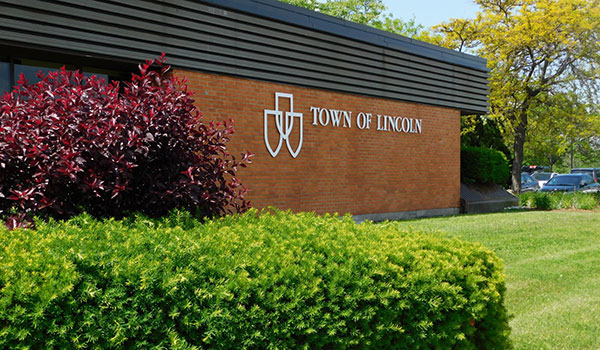
In this edition:
- Cave Spring Cellars CEO Len Pennachetti appointed Member of the Order of Canada
- Business investment per worker fell 20% in 15 years amid weaker competition: StatCan
- Financial sector posts strong gains in Q4 2023 reporting
- St. Catharines Cultural Investment Program applications rolling out for 2024 cycle
- Brock program inspires future Black leaders in local high schools
- NPCA moving headquarters from Welland to Thorold
- Grimsby budget gets final approval
- Battle brewing over Pelham development charge increase
- Second-highest volume in decade for HOPA ports in longest-ever shipping season
- Liberals and NDP reach deal on pharmacare
- Applications for Youth Employment and Skills Program to open
- Focus on Retail

Cave Spring Cellars CEO Len Pennachetti appointed Member of the Order of Canada
Yesterday, Her Excellency the Right Honourable Mary Simon, Governor General of Canada, invested 1 Companion (C.C.), 17 Officers (O.C.) and 42 Members (C.M.) into the Order of Canada during a ceremony at Rideau Hall. The Order of Canada is one of our country’s highest honours. Appointments are made for sustained achievement at three levels: Companion, Officer and Member. Officers and Members may be elevated within the Order in recognition of further achievements, based on continued exceptional or extraordinary service to Canada.
Among the new members is Beamsville-based Len Pennachetti, whose insightful leadership has substantially benefited Canada’s wine industry. Co-founder and CEO of Cave Spring Cellars, he turned the family business into a staple of Niagara’s hospitality industry. He further bolstered tourism through municipal revitalization efforts and by sharing his vision on regional boards. Recognizing the need for a quality-driven appellation system, he was instrumental in establishing VQA Ontario and steered the authority for a decade. He has also fostered the sector’s development as a long-standing director of Ontario Craft Wineries, Wine Growers Canada, and the International Riesling Foundation.

Business investment per worker fell 20% in 15 years amid weaker competition: StatCan
Canadian business investment per worker plummeted by 20 per cent over a 15-year stretch, according to new Statistics Canada research that suggests weaker competition is partly to blame.
The report finds for every worker, businesses invested $628.80 less in their companies in 2021 than they did in 2006.
The decline was more significant in large and medium-sized companies and foreign-controlled businesses, though it’s unclear why that was the case.
The report attributes nearly one-third of the drop to declining entry rates, or the number of new companies starting up by industry.

Canadian corporations reported a 2.7% (+$4.4 billion) increase in net income before taxes (NIBT) in the fourth quarter, reaching $165.4 billion, Statistics Canada reports. This gain was driven by the financial sector (+6.8%), which outperformed the non-financial sector (+1.2%).
The telecommunications industry reported the second-largest gain in NIBT, up $390 million to $2.0 billion in the fourth quarter. Operating revenue was up $586 million to $21.9 billion, largely attributable to an increase in wireless and cable services.

St. Catharines Cultural Investment Program applications rolling out for 2024 cycle
St. Catharines Cultural Investment Program (SCCIP) applications are open for the 2024 funding cycle. With important deadlines approaching, cultural organizations, arts initiatives, and festival producers are encouraged to apply for funding to support their creative endeavours.
SCCIP offers six program streams tailored to specific priorities, eligibility criteria, and evaluation standards.

Brock program inspires future Black leaders in local high schools
When Sali Moieldin (MA ’23) visits with high school students, she shares powerful examples from history while providing inspiration for the future.
As Learning Skills Specialist, Access and Inclusion with Brock’s Learning Services team, Moieldin is spending February teaching dozens of students at four local high schools about Black History Month/African Heritage Month and encouraging them to think about their own plans.
NPCA moving headquarters from Welland to Thorold
Niagara Peninsula Conservation Authority is celebrating its 65th anniversary in April by, among other things, opening a new head office in Thorold.
The authority’s board of directors agreed at its Feb. 16 meeting to move its annual general meeting to April 19 where they will help to “celebrate a major milestone” at the new location at 3350 Merrittville Hwy., across the street from the Canada Games facility.
Grimsby budget gets final approval
Town of Grimsby council formally approved the town’s 2024 operating budget on Feb. 20.
The local levy increases 4.95 per cent this year. Blended with regional and education taxes, the average hike for a home valued at $442,000 in 2016 will be about $222 (the Grimsby portion of the increase is $67).

Battle brewing over Pelham development charge increase
Wednesday’s Pelham Town Council meeting was dominated by discussion of radical alterations to the Town’s development charge system, with Mayor Marvin Junkin declaring that he wouldn’t support the changes as proposed.
Meeting as Committee of the Whole, councillors received a presentation from consultant Byron Tan of Watson & Associates, who was tasked with navigating a new proposal in the wake of the Ford government’s controversial Bill 23 – which will negatively impact all Ontario municipalities’ ability to collect revenues.

2023 sees second-highest volume in decade for HOPA ports in longest-ever shipping season
HOPA Ports has released results for the 2023 navigation season, reporting a combined total cargo of 11,293,179 metric tonnes (MT) through the ports of Hamilton and Oshawa. The 2023 total was a 9% increase from 2022, marking the second-highest volume in the past decade. The season saw a total of 665 vessels, with 603 in Hamilton and 62 in Oshawa, taking advantage of the longest ever Seaway shipping season.
Commodities transiting the Ports of Hamilton and Oshawa represent approximately 30% of total cargoes transiting the Canada-US Great-Lakes Seaway system. HOPA’s cargo totals rose by 9% in 2023 versus a 3.38% increase in system cargo as a whole.
Liberals and NDP reach deal on pharmacare
The Liberals and the NDP have reached a deal to table pharmacare framework legislation, quelling the back-and-forth from recent months that failure to reach an agreement on the issue could put the parties’ confidence-and-supply agreement at risk.
NDP Leader Jagmeet Singh confirmed the news to CTV News on Friday, calling the draft legislation “historic.”
Agriculture and Agri-Food Canada announce applications for the Youth Employment and Skills Program to open
On Feb. 22, the Minister of Agriculture and Agri-Food, Lawrence MacAulay, announced funding of approximately $13.5 million to support a new application intake under the Youth Employment and Skills Program (YESP). The initiative will provide the agricultural sector with help needed to support approximately 1,200 jobs for youth in the sector.
The YESP offers support for 50% of wages up to a maximum of $14,000 to agriculture employers hiring Canadian youth. Employers that hire youth facing employment barriers will be eligible for 80% of the cost of salaries and benefits (to a maximum of $14,000) and may be eligible for an additional $5,000 to address specific obstacles to employment.
Did you know?
100 billion items of clothing are manufactured every year.
Focus on Retail
How the grocery supply chain works, from wheat fields to what’s next
Over the past year, the CEOs of Canada’s biggest grocery chains have become familiar faces to lawmakers studying food prices.
Executives have faced questions from MPs and battled accusations of profiteering as their earnings rise.
But experts say the main factors that have driven grocery prices up over the past couple of years are global.
“The supply chains we have depended on for many decades now have come under massive stresses over the last five years — COVID, conflict, climate change being the most notable examples of big global macro stresses — and that is translated into broad-based inflation for all goods across the global economy,” said Evan Fraser, director of the Arrell Food Institute at the University of Guelph.
Through the Daily Updates, the GNCC aims to deliver important business news in a timely manner. We disseminate all news and information we feel will be important to businesses. Inclusion in the Daily Update is not an endorsement by the GNCC.

















































